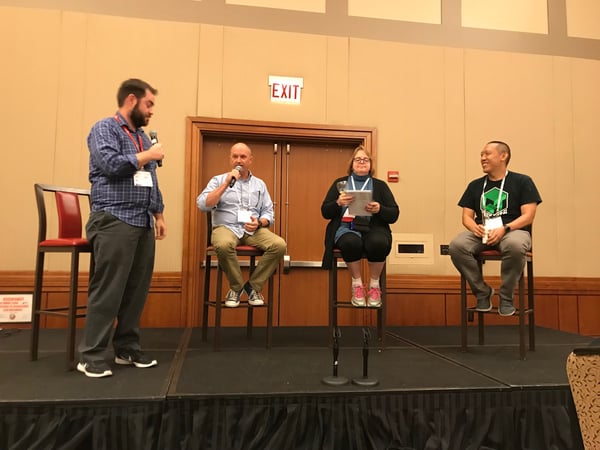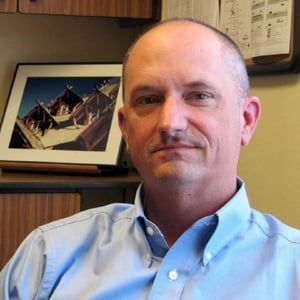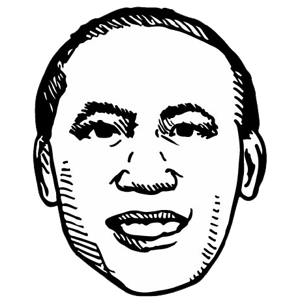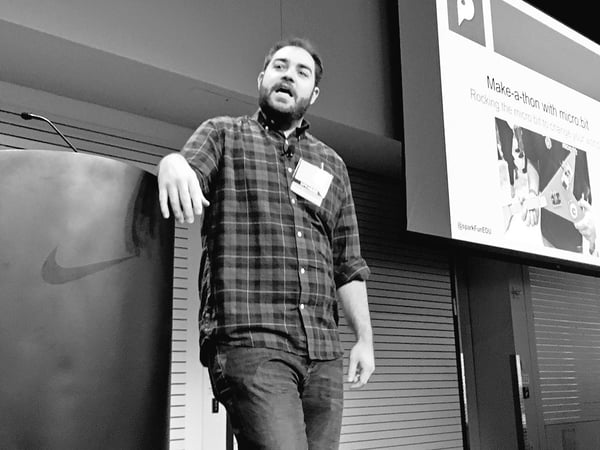At ISTE 2018, we wanted to try something that was truly engaging and informative for our audience. There are many schools out there using SparkFun hardware, and there are many out there who would like to but don’t know how to get started. The thought came to us to get these people in the same room to share their experiences, so our ISTE 2018 staff began planning a cocktail party. Through the planning process it became apparent to us that we might need a way to facilitate the conversation and thus, the SparkFun ISTE Education Panel was born!

The team brainstormed to identify some key players doing really interesting work in their respective districts and invited them to participate. Derek Runberg, our 8th grade technology teacher turned SparkFun Strategic Partnerships Manager, graciously agreed to moderate our panel and generated some questions to get the conversation going.
We had a really great turnout for the panel and Q&A that took place afterwards. The panel discussion brought a lot of people together who otherwise might never have met and we hope those connections were able to start lasting and collaborative relationships.
For those who were not able to attend, let me introduce our panelists along with a few great sound bites that came out of our discussion.
The panelists

Barbara Liedahl is the Media Arts Instructional Specialist for Prince George's County Public Schools, Maryland. Liedahl supervises Media Arts instructors, coordinates professional development, and supports all creative arts supervisors and teachers. For the past six years, Liedahl has produced the PGCPS Student Film Festival. She serves on district and state committees and helped develop the Maryland State Department of Education’s Media Arts State Standards. Liedahl has facilitated workshops and concurrent sessions at National and Regional Conferences on Media Arts, Arts Integration, STEAM, and Technology Integration. She recently presented at the Art Schools Network Annual Conference in Minnesota in 2017, and the National Art Education Association National Convention in Seattle in 2018. Embracing the Universal Design for Learning (UDL) framework, Liedahl promotes cross-curricular collaboration with technology and arts integration, including Science, Technology, Engineering, Arts and Mathematics.
Twitter: @bliedahl

John Peplinski is currently the Administrator for Instructional Innovation for the Beaverton School District in Oregon where he leads the district's Future Ready Schools efforts to innovate classrooms, integrate technology, and create 21st Century libraries. In addition to 15 years of teaching experience and 12 years of school administration experience, prior to joining Beaverton's Teaching and Learning Department, Peplinski was principal at Raleigh Hills K-8 School where he led the transformation of the school into a leading integrated technology school.
Peplinski has a passion for making things and encourages his creative team of Innovation Strategists, Digital Curriculum Specialists, and District Librarians to promote and support the creativity and maker experiences throughout Beaverton schools. One way Peplinski and his team have brought the maker and STEAM experiences to schools has been through the mobile makerspace and STEAM lab he and his team created (futurebus.org). Peplinski and his team believe the world needs more kids made things.
Twitter: @John_Peplinski

Daniel Law has been a computer science teacher at Lane Tech College Prep High School in Chicago for 15 years and has been the department chair for 6 years. In the last six years the CS department has grown from one CS teacher to twelve and will have just over 1800 students taking 13 different CS courses next year.
At Lane Tech, two different maker courses are offered. One is the Innovation and Creation Lab, headed by Jeff Solin. The other is the Physical Computing Lab (PCL), headed by Dan. PCL focuses on providing students the opportunity to stretch their limits by creating prototypes that are interactive with their environment.
Twitter: @thatDanLaw
The Discussion

Here are some of the questions Derek posed to the whole group to get the discussion started:
- What innovations in the past 5 years in regards to classroom technologies have impacted your practice/your teachers practice the most? How has the maker movement / maker technology shown up in those technologies?
- Looking forward, where do you think STEM / STEAM / Maker education will be in the next 5 years?
- What makes your job hard? What is the one thing that frustrates you to no end? Also, how do you counteract that on a daily basis?
Here are some interesting tidbits that came out of that discussion:
- “Start with what your passions are, bring your interests into your teaching and the rest will work it’s way out.”
- “Make first, teach second - push the other end of standards and test scores.”
- “You might ask, if the teacher doesn’t know how it works, how can we expect the students to learn? Isn’t that the blind leading the blind? Be the guide on the ride! Let the students know you are interested in learning and learn with them, it gives the students confidence to explore new things.”
- “Don’t overthink making, don’t have all the answers.”
- “Start with what your passions are, bring your interests into your teaching and the rest will work it’s way out.”
- “We ask the students what they want to do, what data do you want to collect? We involve them in the lesson planning. We are going to create nodes and are just going to mount it on the wall in the school and ask questions later... sorry security! This makes the process more exciting and engaging for students.”
- “Continue to be passionate - hope the students are motivated to jump on for the ride!”
The discussion could have lasted hours with questions from the crowd. We had to cut it off eventually, but we hope to recreate this panel again in the future. What STEM, teaching or hardware questions would you like addressed? Please ask your questions in the comments below.


Events